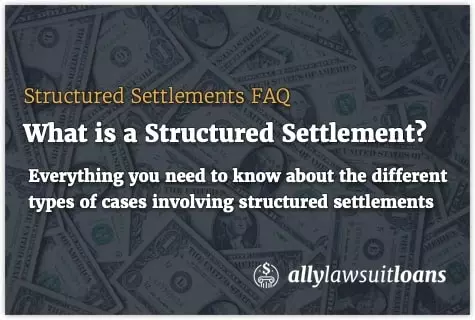
Understanding structured settlements can be confusing at times.
A structured settlement pays you money through a series of payments (known as an annuity) or a lump-sum form of payment.
Structured settlements occur when a claimant agrees to resolve a personal injury claim and receives all or portions of a settlement through multiple payments.
When you file a personal injury lawsuit, you eagerly wait for the day when your settlement payout arrives.
However, you may not know about the many detailed decisions involved in the settlement process.
Below, the team at Ally Lawsuit Loans goes over structured settlements in detail.
If you have questions or want to speak with an experienced lawsuit loan specialist, contact us today.
What is a Structured Settlement?
Structured settlements produce some distinct advantages, but they’re not ideal for every situation.
For instance, should you accept a lump-sum payment or agree to a regularly disbursed structured settlement?
If you’re considering a structured settlement, you can always sell it later (with court approval) for a lump sum.
Types of Cases Covered Under Structured Settlement Loans
Structured settlements first appeared under Canadian law in personal injury cases concerning a 1950’s drug that caused birth defects.
From there, structured settlements made their way into common law legal systems, including in England, Australia, and the United States.
Structured settlements took advantage of two changing elements in personal injury law:
- Rising personal injury settlement amounts, and
- Changing IRS law that waived tax liability.
In the US, structured settlements serve as an option in personal injury cases, including pharmaceutical injury and product liability cases.
Pros and Cons of Structured Settlement Loans
Structured settlements provide both benefits and risks to plaintiffs. Here are some factors to weigh before deciding on a structured settlement.
Pros of Structured Settlements:
- Steady income. Structured settlements provide a steady income for many years. You won’t be able to burn through your money quickly.
- Tax benefits. United States IRS rules give structured settlements favorable treatment. A person receives tax-free disbursements for the life of the structured settlement.
- Beneficiary allowed. Many structured settlements allow a named beneficiary to receive settlement payments if the plaintiff dies before the settlement pays out.
- Option to sell. Structured settlements can be sold or assigned through the courts. This option is useful for paying medical expenses or other debts.
- Stock market-proof. The stock market fluctuations don’t affect your settlement amount.
Cons of Structured Settlements:
- Loss of interest. You lose interest that could accrue if you got your entire payment upfront.
- Taxation. Some parts of a settlement award, such as punitive damages or attorney fees, may be taxed.
- Inflexible payment. Structured settlements stick to a set schedule and are not flexible to meet changes in your financial circumstances.
- Fees and penalties. Withdrawing from or selling a structured settlement brings fees and IRS penalties.
How Does a Structured Settlement Work?
When you file a personal injury lawsuit, your attorney will negotiate the best settlement for you.
Though an attorney should always prepare for trial, most plaintiffs and defendants prefer to reach a settlement.
In settlement negotiations, a defense attorney may present the possibility of a structured settlement.
At that point, your attorney will bring the settlement option to you.
After discussing the structured settlement, your attorney will ask whether you are ready to sign an agreement for that option.
Once you accept a structured settlement, the defendant will pay you through installments of an annuity contract.
You will receive regular installments over an extended period until you reach your full award.
Defendants may purchase an annuity for the settlement from an insurance company.
The insurance company is then responsible for managing the structured settlement.
If a plaintiff later decides that they need a lump sum payment rather than installments, they can sell their structured settlement annuity.
Companies such as Ally Lawsuit Loans offer a streamlined structured settlement cashout.
The value of the structured settlement at the time of sale depends on:
- Payments disbursed
- Amount of scheduled payments
- Interest rates on the annuity
- Insurance company creditworthiness
A judge must approve and sign the sale of a structured settlement annuity.
Apply for a Structured Settlement Today
Now that we’ve answered your question, “What is a structured settlement?” you may be considering this option.
However, maybe you already have a structured settlement but are looking for a way out of it.
If your financial needs change and you want a lump sum instead of structured settlement payments, contact the team at Ally Lawsuit Loans today.
We can purchase your structured settlement annuity in exchange for a lump sum of cash.
We offer 24-hour approval on structured settlement purchases.
Then, we bring your structured settlement to the court for approval.
Contact us at 844-771-2957 to apply for a structured settlement purchase or ask for more information about this option.
Are you ready to apply?
We offer 24-hour approval on structured settlement loan purchases. Then, we bring your structured settlement to the court for approval.


